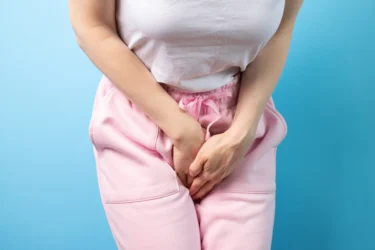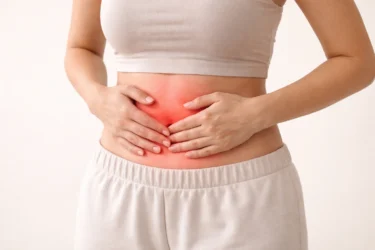Most women of reproductive age menstruate unless they are pregnant, breastfeeding, or have underlying medical conditions. On average, a normal menstrual cycle lasts about 28 days (with a variation of roughly 7 days more or less), though it can range from 21 to 35 days in adults and 21 to 45 days in young teens1.
You might wonder whether there are ways that may help your period start sooner. Before we get into that, let’s first understand what a normal menstrual cycle looks like and how it differs from an irregular one. We’ll also explore common reasons why periods may be delayed.
Next, we’ll discuss safe ways to manage delayed periods, including lifestyle adjustments, natural approaches, and medical options, while highlighting what is safe and what should be avoided. Then we’ll check the risks and safety tips to keep in mind. Ready? We will also answer some common questions about periods in the end!
Friendly Reminder: The information shared here is for educational purposes only and the reader should consult a registered medical practitioner before implementing any changes to their health routine.
First, let’s get the basics right. Knowing what a healthy menstrual cycle is and what causes delays is important.
The menstrual cycle prepares your body for pregnancy and is influenced by certain reproductive hormones. These hormones thicken the inner lining of the uterus, preparing it for implantation of a fertilised egg. If an egg is not fertilised during this cycle, hormone levels drop. This starts a “period” as the lining sheds1.
There are several reasons why your period may be delayed, including the following2:
Lifestyle or food changes may be made should you wish to get your periods faster for just one cycle. However, if your “how to get periods immediately or faster” is a more recurring query, you need medical guidance as frequently delayed periods might need some medical intervention.
Dr Ashish Bajaj, M.B.B.S., M.D. in Clinical Pharmacology and Toxicology
Still searching for how to make your period start sooner over the internet? If your periods are late and you’re not pregnant or suffering from a medical condition, there are some approaches that may help your periods start sooner.
Many people use natural remedies and supplements to get their period started. It is important to remember that these traditional approaches lack strong scientific support and may work differently for different people.

Although it is said that vitamin C supplementation can possibly start periods, there is no scientific data to support this claim3. In fact, this is not a recommended method as high vitamin C doses may lead to kidney stones4.

Bromelain, an enzyme in pineapple, may affect menstrual hormones5.

Traditional wisdom believes that ginger can start menstruation by causing uterine contractions, even though there’s no solid proof of this6.

Parsley helps with balancing hormones in women and enhances oestrogen secretion7. Thus, it may help in getting the period sooner.

Some people believe turmeric can affect hormone levels and help induce periods, but there’s no scientific proof of this8.

These herbs may increase blood flow to the uterus or help shed the uterine lining, which may lead to periods9.
Caution: Periods cannot be reliably induced or hastened by foods, herbs, or home remedies. Traditional remedies, although believed to influence menstruation, are not proven to be effective and may carry health risks. These methods should be considered traditional beliefs, not evidence-based solutions. Therefore, always consult a gynaecologist before trying to manage or alter your menstrual cycle.
Ideally, one must not disturb body’s natural cycles. If your periods make your daily routine tasks difficult to carry out, consult a gynaecologist for evaluation.
Dr. Arpit Verma, MBBS, MD (Pharmacology)
Changing your lifestyle and being active might help start periods. However, remember, the effectiveness of these methods may vary from person to person.
High doses of vitamin C may induce menses by increasing the levels of oestrogen in the body. Increased levels of this hormone stimulate uterine contractions, which in turn, stimulates bleeding.
Dr. M.G. Kartheeka, MBBS, MD(Pediatrics)
While lifestyle changes may help some individuals, hormonal treatments provided by a healthcare professional are the most reliable way to regulate periods. Always consult your gynaecologist before starting any treatment.
Important caution: Hormonal contraceptives are intended for cycle regulation, not for immediately inducing a period. Any changes to dosage, timing, or method should only be done under a doctor’s supervision.
Also Read: PCOS Diet: How to Use Food to Help Manage Your PCOS
Any attempt to alter normal body function carries risks, and trying to induce a period is no different.
Never attempt to induce your period if there is any possibility of pregnancy, as this can lead to serious complications. Always consult a healthcare provider/doctor before trying any method to manage or regulate your cycle.
While attempting to induce periods can be beneficial sometimes, it has its own set of risks. You might face hormonal imbalances, disturbed period patterns, or side effects from medicines.
It’s important not to try and start your period if there’s a chance you might be pregnant. Substances that induce menstruation can also cause miscarriages.
Repeated irregular cycles may signal underlying health conditions such as PCOS, thyroid disorders, or premature ovarian insufficiency. Therefore, such cases require proper evaluation and workup by a doctor before attempting any intervention.
Get professional help if your period is consistently irregular, you miss three periods in a row, your periods stop before the age of 45, or you bleed between periods or after sex, or postmenopausal bleeding is noted.
Also Read: How To Know If You’re Pregnant?
We’ve covered what affects menstrual cycles, safe ways to manage delays, and the role of both natural and medical approaches. Remember, your body is unique, and variations in periods are normal. However, if your cycles are irregular or you miss three or more periods, consult a gynaecologist to rule out conditions like PCOS, thyroid disorders, or premature ovarian insufficiency. Avoid unproven or unsafe remedies, and rely on a healthcare provider for guidance on period-related concerns.
Also Read: Why is My Period Blood Black? Understanding the Underlying Health Facts
You could feel bloated or moody or have headaches, back pain, tender breasts, and cravings before your period arrives.
The substances used to induce periods can lead to a miscarriage. If you suspect you may be pregnant, do not attempt to induce your period. Instead, speak to a healthcare provider.
It’s important to note that attempting to induce your period artificially can have health risks. Menstrual cycles vary, and it’s best to let them occur naturally. If you have concerns about menstrual cycle irregularities, consult a healthcare professional for personalised advice.
While the chances are low, it is still possible to get pregnant during your period, especially if you have a shorter menstrual cycle. It’s crucial to use contraception consistently if you want to avoid pregnancy, as fertility varies among individuals.
Yes, a menstrual period may be delayed by 10 days due to various factors such as stress, hormonal changes, or underlying health conditions. If concerns persist, it is advisable to consult a healthcare professional for personalised guidance. Your period can be late due to stress.
No, a typical menstrual period does not occur during pregnancy. However, some pregnant individuals may experience light bleeding or spotting, often mistaken for a period. If there’s any uncertainty or concern, it’s essential to seek advice from a healthcare professional.
Yes, occasional period delays are normal and may be influenced by factors such as stress, hormonal fluctuations, or lifestyle changes. However, persistent or significant delays may warrant consultation with a healthcare professional to rule out underlying issues.
It is not possible to induce your period overnight. Menstrual cycles are natural processes influenced by hormonal changes. It’s crucial to maintain a healthy lifestyle, including regular exercise, balanced nutrition, and adequate sleep, for overall reproductive health. If you have concerns about your menstrual cycle, consult a healthcare professional for personalised advice.
Disclaimer: The information provided here is for educational/awareness purposes only and is not intended to be a substitute for medical treatment by a healthcare professional and should not be relied upon to diagnose or treat any medical condition. The reader should consult a registered medical practitioner to determine the appropriateness of the information and before consuming any medication. PharmEasy does not provide any guarantee or warranty (express or implied) regarding the accuracy, adequacy, completeness, legality, reliability or usefulness of the information; and disclaims any liability arising thereof.
Links and product recommendations in the information provided here are advertisements of third-party products available on the website. PharmEasy does not make any representation on the accuracy or suitability of such products/services. Advertisements do not influence the editorial decisions or content. The information in this blog is subject to change without notice. The authors and administrators reserve the right to modify, add, or remove content without notification. It is your responsibility to review this disclaimer regularly for any changes.
Each woman’s experience with pregnancy is unique. Some women may have a feeling they’re pregnant as early as the first few weeks of their pregnancy, while others may not realise they are pregnant until they miss their period. Let us understand some of the early signs that may indicate a pregnancy before a missed period.

Extreme weariness or exhaustion is one of the most common early signs of pregnancy. Even if you have had 7-9 hours of sleep, activities that have never affected you before may exhaust you. During pregnancy, the body’s increased metabolic demand might cause fatigue and increase your nutritional needs. The fatigue may also be caused by increasing progesterone levels and changes in blood volume1. This symptom may normally last during the first trimester and may be managed with dietary changes and supplements. However, if the fatigue is severe, it is recommended to get a complete blood count to rule out anaemia and thyroid profile.

You may notice an increased need to urinate1, not associated with a foul smell or burning sensation, even before you miss a period. If you experience a burning sensation or a foul smell with urination2, you should get a urine routine and culture done to rule out a urinary tract infection.

In the first few weeks after conception, you may also notice an increased cravings for certain foods. Some women also experience a sudden and increased sensitivity to smells and intense flavours along with food aversions that may or may not persist throughout the pregnancy. If you have severe food aversion with vomiting more than three times a day and weight loss, you may have hyperemesis gravidarum (severe and persistent nausea and vomiting during pregnancy)3. For a balanced nutritional intake, you should consult a dietician or your gynaecologist.

A week before the missed period, you may notice sore, painful, heavy breasts or darkened areolas. The breasts may become sore and painful due to increased oestrogen and progesterone levels after conception4. This symptom may also occur in the luteal phase of the menstrual cycle or if you have fibrocystic breast disease, in which case the tenderness may be localised or associated with lumps in the breast tissue.

Usually, your temperature rises before ovulation and returns to normal following the menstrual cycle. However, if the basal body temperature remains elevated for a longer time, it may be an early sign of pregnancy5.

Lightheadedness or dizziness is an early sign of pregnancy that affects many pregnant women. The discomfort may last for the first trimester and then gradually fade. However, dizziness may also be caused by anaemia or low blood pressure3. So you should get early pregnancy laboratory tests like complete blood count, monitor your blood pressure, and increase hydration to rule out other causes of dizziness.

An increase in vaginal discharge, along with a thicker consistency of the discharge, can be an early sign of pregnancy. However, if you experience a stinging sensation, itching, or soreness around the vaginal area along with discharge, you may have a vaginal infection, for which you should get checked by a doctor6. Also, a thick discharge is not always pregnancy-related, it could also be due to infection or hormonal changes.
Always, a pregnancy should be confirmed by a urine test and ultrasound abdomen by your obstetrician.
Dr. M.G. Kartheeka, MBBS, MD(Pediatrics)

Cramping is a common early pregnancy symptom and is often mistaken for premenstrual cramps or period-related discomfort. In early pregnancy, this cramping is usually mild and caused by increased blood flow to the uterus or implantation. However, it’s important to distinguish implantation cramping from signs of more serious conditions, such as a threatened abortion or ectopic pregnancy7. Cramping that is severe, localised to one side, or accompanied by vaginal bleeding can be considered a warning sign and needs immediate medical attention.

A week or so before your period is due, you may experience some discomfort and a slight vaginal discharge of light pink or brownish blood. This is called implantation bleeding or spotting, which occurs as the fertilised egg attaches to the uterine lining. Spotting may sometimes be mistaken for a period. Spotting may also be experienced in ectopic pregnancies or early miscarriage. Therefore, if spotting is accompanied by pain, dizziness, or heavy bleeding, you should get an ultrasound done8.
Also Read: Myths and Facts About Pregnancy

Bloating or stomach cramps are one of the most common pregnancy symptoms before a missed period. Progesterone, which increases in the initial stages of pregnancy, can slow down the movement of the gastrointestinal tract, causing bloating. Bloating can also occur with premenstrual syndrome (PMS), but unlike PMS-related bloating, which usually subsides once the period begins, pregnancy-related bloating may persist9.
Certain abdominal or ovarian cysts can sometimes cause symptoms or physical findings, like abdominal bloating or a palpable mass that may be mistaken for early pregnancy or, less commonly, a twin pregnancy. A detailed medical history and a thorough scanning technique are essential to diagnose or rule out pregnancy.
Dr. Ashish Bajaj, M.B.B.S., M.D., in Clinical Pharmacology and Toxicology
A home urine pregnancy test might be able to tell you if you are pregnant, but it’s not always 100% reliable10. To confirm the pregnancy and make sure it is not an ectopic pregnancy (pregnancy growing in the fallopian tubes), doctors often recommend an internal ultrasound at around 6 to 7 weeks. In some cases, like if the test result is unclear or if an ectopic pregnancy is suspected, a blood test called beta-hCG can give more accurate information.
You should see a doctor if you have light bleeding with pain, feel very dizzy or faint, or have ongoing vomiting. It’s also important to get checked if you have a positive pregnancy test with lower tummy pain, or if you notice burning, itching, or unusual discharge from your vagina. These signs may need early medical care to keep you safe and healthy.
Also Read: How to Increase Female Libido Safely and Effectively
Many early pregnancy symptoms are similar to premenstrual syndrome or other health conditions, making it difficult to rely on symptoms alone. While these signs may give you clues, they are not diagnostic by themselves. The most reliable way to confirm a pregnancy is by taking a pregnancy test, especially if you’ve missed your period and suspect you might be pregnant. Always consult your gynaecologist for confirmation and further guidance, as early prenatal care plays a vital role in ensuring a healthier pregnancy journey for both mother and baby.
Also Read: Early Signs of Implantation: What to Expect Before You Miss Your Period
Disclaimer: The information provided here is for educational/awareness purposes only and is not intended to be a substitute for medical treatment by a healthcare professional and should not be relied upon to diagnose or treat any medical condition. The reader should consult a registered medical practitioner to determine the appropriateness of the information and before consuming any medication. PharmEasy does not provide any guarantee or warranty (express or implied) regarding the accuracy, adequacy, completeness, legality, reliability or usefulness of the information; and disclaims any liability arising thereof.
PCOD (Polycystic Ovarian Disease), often used interchangeably with PCOS (Polycystic Ovary Syndrome), is a common hormonal disorder affecting women of reproductive age. The hormonal imbalance in the body produces more male hormones than needed which leads to problems in menstruation and fertility along with other issues. Women with PCOD may have irregular or prolonged menstrual cycles, as well as high levels of male hormones.
PCOD results in enlarged ovaries with multiple small follicles and is associated with hormonal imbalance, irregular periods, and difficulty in conceiving.The ovaries may produce a large number of tiny collections of fluid (follicles) and do not release eggs on a regular basis. If left untreated, PCOD can cause more serious problems like heart disease and diabetes1.
In PCOD, many small sacs called follicles fill up with fluid inside the ovaries. Each follicle contains an immature egg that does not mature enough to release the egg by a process called ovulation. The absence of ovulation leads to hormonal imbalance and an excess release of male hormones. Research has not found the exact reason why PCOD occurs as the cause of PCOD is multifactorial and include2:
PCOD signs and symptoms usually appear around the time of puberty, typically noticeable at the time of a girl’s first menstrual period. However, PCOD can also develop later in life, particularly, as a result of significant weight gain. Many women may not realise that they have PCOD, but there are certain common signs and symptoms to look out for, these may include the following2:
Unwanted hair on the face, neck or other body parts is a symptom of hormonal imbalance as seen in PCOD. People often opt for hair removal sessions without consulting a doctor. Instead of just opting for these procedures, consult your gynaecologist or endocrinologist for proper diagnosis and treatment.
Dr. Arpit Verma, MBBS MD (Pharmacology)
PCOD, if untreated, may increase the risk of3,4:
Also Read: 5 Early Signs Of Labour Every Expecting Mother Should Know
PCOD5 is a condition without a cure. You may, however, manage the illness with appropriate treatment and lifestyle changes. Taking a ultrasound or blood tests that assess LH/FSH ratio, anti-müllerian hormone, and androgen levels may help to diagnose PCOD. Treatment usually focuses on symptom control and long-term metabolic health. This may include7,8:
Research9 indicates that women with PCOD are potentially at high risk for CNS and cardiovascular disease. Many of these women have extremely high levels of serum lipoprotein, blood glucose, and cholesterol, which also increase the risk of insulin resistance. Women with PCOD may also have a higher risk for developing endometrial cancer.
Dr. M.G. Kartheeka, MBBS, MD (Pediatrics)
Also Read: IVF (In Vitro Fertilization): What is It, Procedure, Steps, Side Effects & More
If you experience irregular periods, unwanted hair growth, or difficulty conceiving, do not ignore these signs. Consult your gynaecologist or endocrinologist for a comprehensive diagnosis and treatment as it can help prevent complications.
Also Read: Effective Home Remedies For Vaginal Dryness
Disclaimer: The information provided here is for educational/awareness purposes only and is not intended to be a substitute for medical treatment by a healthcare professional and should not be relied upon to diagnose or treat any medical condition. The reader should consult a registered medical practitioner to determine the appropriateness of the information and before consuming any medication. PharmEasy does not provide any guarantee or warranty (express or implied) regarding the accuracy, adequacy, completeness, legality, reliability or usefulness of the information; and disclaims any liability arising thereof.